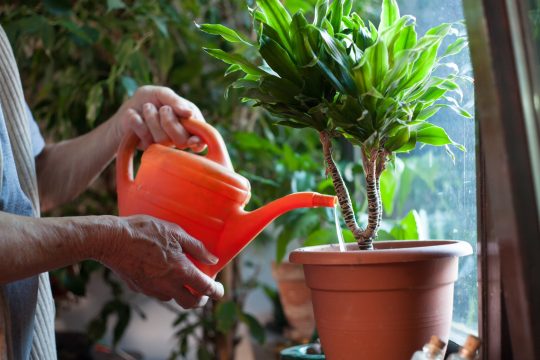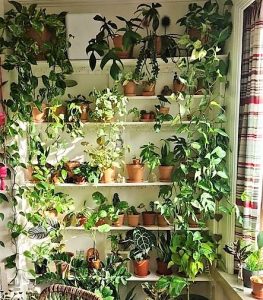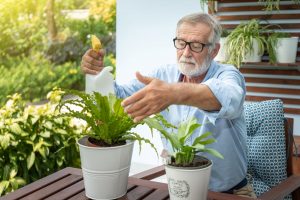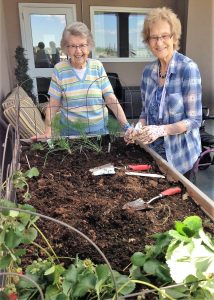
Lush foliage and vibrant flowers can breathe life into your home.
The popularity of indoor gardening has soared in recent years, and it’s easy to understand the growing popularity. Not only are they aesthetically pleasing, plants offer proven health benefits as well!
Inexpensive and easy to care for, older adults can easily surround themselves with greenery by bringing a bit of nature into the comfort of their own home.
The Benefits of Houseplants for Seniors
 Multiple studies have proven that plants keep you healthier and happier, offering both psychological and physical health benefits that include:
Multiple studies have proven that plants keep you healthier and happier, offering both psychological and physical health benefits that include:
- Improving your mood
- Reducing fatigue
- Lowering stress and anxiety
- Boosting healing and pain tolerance
- Improve air quality
- Easing dry skin and respiratory ailments due to dry air
That’s where houseplants come in.
1. Indoor Gardening is Accessible
It can sometimes be challenging for seniors who use wheelchairs or walkers to indulge their inner green thumb. By placing plants on a table or counter that’s easy to reach, they can enjoy all the benefits of gardening – indoors!
2. Plants Reduce Indoor Pollution and Increase the Air Quality Within Your Home!
A now legendary study by NASA found that plants not only purify the air by converting carbon dioxide into oxygen, they also scrub the air to remove toxins–up to 87% of volatile organic compounds (VOCs) every 24 hours. You’ll breathe easier knowing that nature’s stewards are hard at work keeping the air fresh!
Our top picks for plants that increase air quality are Aloe Vera plants, peace lilies, and snake plants.
3. Added Humidity Helps Maintain Health
Houseplants evaporate water through their leaves in a process called transpiration. Some studies show that added humidity and moisture is great in the cooler months as it decreases dry skin, sore throats, and coughs.
Our top picks for plants that increase humidity are dracaena plants, philodendrons, and bamboo palm.
4. Improve Your Mood
 Strategically placing plants throughout a residence will improve the atmosphere and boost everyone’s mood. According to a study published in Journal of Physiological Anthropology, active interaction with indoor plants (like touching and smelling) can reduce physiological and psychological stress. What’s more, even the potting soil can help. This is because soil contains microbes dubbed “outdoorphins” (M. vaccae) that work as natural antidepressants by triggering the release of serotonin.
Strategically placing plants throughout a residence will improve the atmosphere and boost everyone’s mood. According to a study published in Journal of Physiological Anthropology, active interaction with indoor plants (like touching and smelling) can reduce physiological and psychological stress. What’s more, even the potting soil can help. This is because soil contains microbes dubbed “outdoorphins” (M. vaccae) that work as natural antidepressants by triggering the release of serotonin.
Touching plants and flowers is great sensory therapy, and the dark green of most houseplants is an extremely soothing colour. Succulents and air plants are also a treat for the eyes and thrive with barely any water.
Try pothos, English Ivy, Lavender, or Chinese Evergreen.
5. Allergy Relief
Yes, having house plants might actually help your allergies!
Researchers found that rooms with plants have less dust and mold than rooms without any foliage. Leaves and other parts of the plants act as natural filters to catch allergens and other airborne particles.
Like all plants though, some varieties have the potential for making allergies worse if they’re not cared for correctly.
Some good air-scrubbers are dracaena, lady ferns, violets, and other plants with textured leaves. Avoid plants with pollen or spores.
6. Plants May Reduce the Risk of Dementia
Spending time daily with plants can reduce the likelihood of dementia by up to 36%, according to a 16-year study of 2,800 older people at St Vincent’s Hospital in New South Wales, Australia. This surprising figure is comparable the benefits of physical activity in reducing the risk of cognitive decline.
Seniors and their loved ones can use plants as a method of sensory stimulation, which can reduce disease progression. Some communities offer specially designed gardens for residents in memory care, but even in suites, a variety of plants of different colors, textures, and smells can be stimulating and enjoyable.
Plant Therapy
Plant or horticultural therapy has been shown to reduce the risk of dementia by up to 36 percent. Because the activity combines learning, strength, consistency, and stamina, it has many positive effects for anyone, but especially for seniors. In the winter, when the garden is inaccessible, tending a bonsai tree or a small indoor herb garden is a great alternative.
Environment Chosen with Care
 In 2018 Ralph Wild – from one of our retirement homes in Winnipeg – spoke to reporters on his 100th birthday. Wild, who flew planes for the RAF in WW2, talked about the importance of living with nature.
In 2018 Ralph Wild – from one of our retirement homes in Winnipeg – spoke to reporters on his 100th birthday. Wild, who flew planes for the RAF in WW2, talked about the importance of living with nature.
In keeping with his philosophy, we encourage houseplants to create a feeling of movement, life, and change inside.
While the locations of our many senior living centres are chosen for their proximity to nature, greenery, and walking paths, All Seniors Care goes the extra mile. By filling common areas with Ivy, Peace Lily, Bamboo Palms and other plants, we create a nurturing, organic mood for you to enjoy.
With spring and summer just around the corner, why not create your own personal oasis on your residence balcony? It would be the perfect place to sit with friends or enjoy some neighbourhood views.
If you have any questions about the All Seniors Care experience, feel free to explore our website and contact any of our residences – we have senior homes in Ottawa and four other provinces. You can also learn about the latest events hosted at our various residences and check out our YouTube channel to explore some fun videos!
